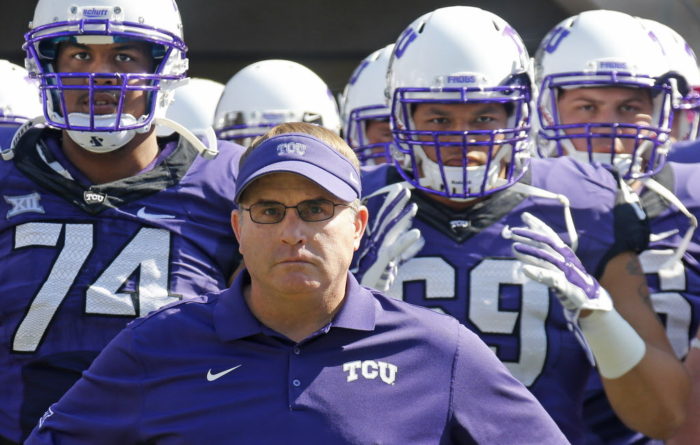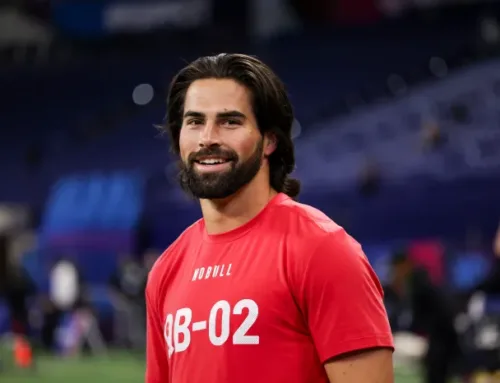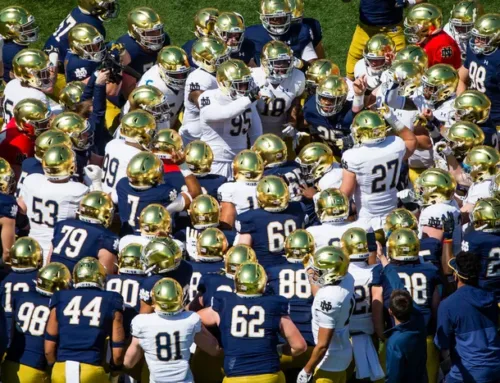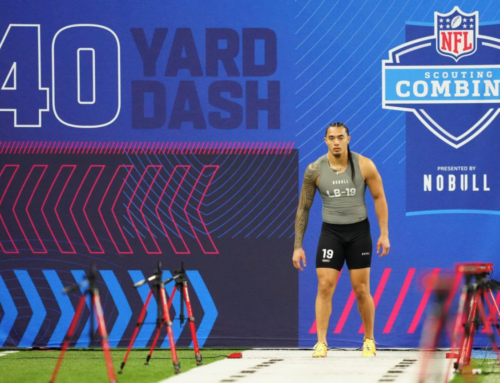It’s becoming increasingly clear that Notre Dame will be in the market for a defensive coordinator sooner rather than later. Suffice to say, the problems on defense are not only overshadowing the program but seriously threaten the stability and viability of the Brian Kelly regime in South Bend.
The situation is frustrating not only because of the fruitlessness of the scheme and the stubbornness that will likely keep VanGorder around through the end of 2016. For the record, I would completely support an in-season firing if things proceeded to that point–I don’t think we’re there yet, though. In my mind, I hate thinking about waiting to mid-January to go out and sign a new defensive coordinator because of reasons I’ll discuss below.
No, the situation is frustrating also because in the Age of Offense it is really hard to roll a strike with the right defensive coach, system, and mindset.
Accepting occasional futility
Is it just me or have many of us not full adjusted to the boom of offense in recent years? Back in 1996, only 32 out of 111 teams at the FBS level averaged 30 points per game. In 2015, that number rose to 57 out of 127 members for an increase of 16 percent. Additionally, the number of Power 5 programs averaging at least 30 points per game rose 75% from 1996 to 2015. Some of that is the watering down of schedules, but still.
Despite this, you definitely see outrage based on very small sample sizes. How many times have you heard someone ripping a defense after one game? What would it take for VanGorder to “make up” for the opener at Texas, show real improvement, and win over some doubters? Honestly, would 3 straight shutouts change the narrative?
Even more to the point, despite being behind the 8-ball these days defense often doesn’t get the benefit of the doubt. For example, show me an offense and defense who play a perfectly equal 9 good games and 3 bad games and I guarantee you the outrage is louder and more fervent on the defense. We could probably explain this in points, too. Most of the time 30 points is considered a job well done for an offense when in today’s game it should probably be something closer to 40 points against an average opponent. In contrast, we’re still stuck in the mindset that it’s really bad when the points on defense start to creep over 20 per game.
I’m not sure how we’re supposed to adjust our expectations I just know it hasn’t happened where defenses get a fair shake on a consistent basis. I suspect the “defense wins championships” mantra is simply too strong even in 2016. Plus, games like Arizona State-Texas Tech (123 combined points with 1,264 combined yards) from over the weekend certainly don’t help the cause.
Lack of consistency
Back in 2009 I had Gary Patterson really high on my list to coach at Notre Dame. Ultimately, probably not a good cultural fit and he’d be terrible with the media but part of me still would have wanted to see how he could have performed. Anyway, Patterson is usually on the list of the top defensive minds in the country and someone who has been on the vanguard of defending spread offenses with his 4-2-5 scheme.
But even Patterson is a good example of how hard it is to be consistently good on defense. The Frogs just allowed 41 points in their first two games and have allowed at least 30 points in 8 out of their last 13 games. They’ll probably give up at least 30 in 4 or 5 more games in the Big 12, too.
Now, I’d argue Patterson is one of the few guys who gets a pass due to his history and having to play in the wide-open Big 12. He’s also received praise for making smart hires on offense which have masked some of the defensive problems–even this past weekend TCU out-gained Arkansas by 169 yards and still lost.
With all that said, switch the name on Patterson’s defensive resume and I’m not sure that guy is getting all that much love anymore.
We also see the problem of defensive coaches getting head jobs and failing. Case in point, Will Muschamp. In the years running up to the beginning of this decade there was no hotter defensive name in the game. Muschamp was in his late 30’s and someone who could have realistically had his pick at several blue-blood programs. Today, he’s considered more of a joke than anything and already 0-1 in the SEC this year. Not that some don’t still believe he’s a great defensive mind, it’s just he’s been taken down a peg or three.
In contrast, consider someone like Rich Rodriguez. He failed spectacularly at Michigan and has moved on to doing his thing at Arizona for a number of years. Maybe it’s because he’s out west now and under the radar but his reputation was rehabilitated and is completely safe now. Rich Rod nearly lost to Grambling over the weekend then scored 28 second-half points to pull out the victory, and it hasn’t phased his critics.
With offensive coaches once they reach a certain level of competency we tend to leave their reputations there without a ton of critique years down the road. For the defensive guys it’s a much more volatile life.
Lack of young DC talent
Quick, name the top three defensive minds in the country under the age of 40….
Back in January I discussed 10 defensive coordinators that I’d target in case Notre Dame wanted to look for someone new. Their ages were 48, 44, 50, 53, 60, 48, 60, and 63. The only two under 40 were Josh Conklin (Pitt, 37) and Marcel Yates (Arizona, 38) neither of whom have been that special and were definitely near the bottom of my list.
This is a huge problem in the age of offense. The best defensive minds take a really long time to earn their keep and establish themselves not only at the head coaching level but as coordinators.
A couple hot names in recent months have been Don Brown and Todd Orlando. The former was snagged by Michigan this off-season and is in just his 6th year as a DC at the Power 5 level while being 61 years old. Orlando’s reputation has been picking up steam at Houston and to his credit he’s been a DC for 10 years but he’s already in his mid-40’s.
You just don’t see huge sparkling comet defensive coordinators like Muschamp anymore. Right now among the current Top 10 in the AP Poll there is one head coach with a defensive background: Nick Saban. You have to go to Charlie Strong and Mark Dantonio just outside the Top 10 for the next defensive coaches and those leaders became head coaches at 50 and 48 years old, respectively.
What this means for the future
There are no easy answers. Ideally, you pick up a defensive coordinator who is ready to blossom as he’s entering middle age and you get the benefit of that production without the guy being tempted by head coaching gigs in an era where venturing out on your own as the leader of a program can be quite unkind. Unfortunately, those guys are very hard to identify each year.
In most ways, Bob Diaco was the perfect candidate. Hired by Brian Kelly at age 36 and taking over the Irish defense at 37 years old. It’s tough to think we couldn’t have worked out his recruiting flaws in some ways and wished that he would’ve stayed for a solid 10 years in South Bend. It seemed like he left town a little early but in the grand scheme had he stayed it wouldn’t have been for much longer and we’d be looking for a new DC right around now anyway.
With all the issues present you can see why waiting until December (or much later) to make a new DC hire isn’t necessarily the best scenario. That’s assuming things might get really bad for VanGorder this season–don’t be afraid to pull that trigger for the benefit of the long-term. Just think about this past off-season where a 60-year old whom you never heard of as late as the early fall of 2015 was the top name to sign. Good luck!





Eric, this is really a great topic – the need to temper expectations on defense when considering the current CFB landscape. However, nobody was calling for the DC’s head after one game. It was after two seasons and one game. I’d happily argue that with the right offense, special teams and overall talent, ND doesn’t need a top 20 defense to be competitive on a championship level. But it does require a defense that can at times step up and be counted on. Not to shut a team down. That’s darned near impossible in this day and age. But rather, counted on to make the late stop when needed, or help maintain momentum after a big score. It seems time and time again, BVG’s units are the culprits in giving momentum back or giving up a late lead right after the offense battled back to take it or at least get within striking range. My big concern in the let downs isn’t that they aren’t able to stop overall some high powered offenses. Even pretty good offenses from big time programs are simply going to get theirs. But it looks to my amateur eyes like the breakdowns when the defense is needed the most have less to do with being overpowered or out-gunned, and more to do with poor fundamentals when they are needed the most. I’m mostly talking poor tackling, bad angles and blown coverages. Not to mention pre-snap confusion leading to bad alignment. These are indicative of a system that just doesn’t work at the college level and takes too much time away from getting better at the basics. Funny, I was also on the Patterson bandwagon big time. But I think the college offenses have surpassed the 3-3-5 scheme that he used to build TCU into a defensive juggernaut at one point. It was a great answer at the time for defending the spread when it was still more finesse. Now we see teams like Baylor, Auburn, Texas all of the sudden, Ohio St., Notre Dame and many more attacking that style of defense from the spread by using power concepts from the spread – especially on the edges. This is exactly what Texas did to ND all night while BVG stuck with an undersized 3-3-5 front using an undermanned back 5. I’ll give Diaco one thing for certain, his defenses tackled well. Even when they bent at times, that was one big component to keeping them from breaking. Patterson isn’t suddenly a bad coach, but as this article illustrates, the game changes. So, it seems, has his path to success. TCU still wins a lot of football games, in spite of their defense being nowhere near where they were five years ago. I’m not sure where I stand on the pull the trigger argument. I still think this season has potential, and I’m not sure how that would work out. Are any of the assistants able to carry that load for the rest of the… Read more »
Good point about Diaco’s defenses and sound tackling. I wonder if this was so because Diaco emphasized specific tackling technique and spent more time on it or if it was instead because Diaco’s bend but don’t break scheme was so front and center that everyone in the entire organization knew the primary defensive goal of limiting the big play? When everyone knows that primary goal going in, and when they know they will be critiqued most harshly for anything getting past them, players tend to exert all their best efforts on that understood focal point.
In BVG’s defense, I think there is a confusion of priorities. Is the highest priority exerting pressure on the offense? Is it reading keys? Is it forcing plays inside? Is it turnovers (man, I hope not, because if so we are failing utterly at it)? Is it jack of all trades, where sometimes we play a version of BBDB and other times we are doing anything but that as our pre-snap alignment at times invites an undefended seam route over the middle?
To be fair, I know that within Diaco’s scheme there were variations, but the overriding goal – and everything funneled into that construct – was to eliminate big plays. Notwithstanding the impossible string of injuries and recruiting lapses in the secondary particularly (which are real excuses, I get that), I keep thinking we ought to be able to defend like many other programs who string together competent defenses with lesser athletic talent than even ND’s second string. At some point coaching needs to be the answer.
Muschamp is 1-1 in the ESS EEE SEEE.
For what it’s worth…probably should be 0-2, but he did pull out that first game.
Vandy, right? Wow totally forgot they opened with 2 SEC games.
Yep. They’re lucky not to be 0-2, they looked like hot garbage in that game.
Muschamp has no business being a head coach, but he’s good at coaching defense. Defense was never the problem at Florida, it was the junior-high level offense his teams fielded. His D last year at Auburn was not so great Bob, but you could give that more of an “incomplete” than an F, because Auburn is total clown shoes crazy.
What’s the argument for getting rid of BVG during the season for the sake of the long-term? Is it that if we got rid of him, then as soon as jobs start opening up after regular seasons end we could hire a new DC whereas if we kept him we wouldn’t do that until after bowl games? Why couldn’t we just fire him after the regular season and hire a new one before the bowl game anyway? It seems like it may not matter for the long-term whether he stays through the season or not. What am I missing?
More weight behind back channel negotiations if you already have an opening and you have weeks to prepare instead of days.
Makes sense. So if you know you want to fire him at the end of the season then it is actually better to do it before that (better anyway for hiring the next coach, maybe not better for the rest of the season).
Or we could force him to ‘retire’ at the end of the year and announce it now. That way we can start the search but keep him on for the rest of the year.
I think I’m on to something. BVG would be totally cool with this right?
BVG has never been ‘cool’ with anything. When it was announced that Monty was getting a scholarship, he screamed at the admissions department for coddling Monty. When it was announced he was getting the ND job, he screamed at BK that he would be getting BVG’s body, mind, and soul. When it was announced that the iPhone 7 wouldn’t have a hole for headphones, he called Tim Cook (a random guy in south bend named Tim who is a chef, not anyone affiliated with Apple) and screamed at him about catering to millennials.
I guess what I’m saying is, he probably wouldn’t mind too much.
“There are no easy answers.”
That pretty well sums it up. Thanks for an accurate but depressing analysis.
Thanks for another thoughtful article Eric. It makes a great point that’s often overlooked, i.e. Offenses now have a decided advantage over defenses and score much more prolifically.
As usual I have a few points of disagreement:
1. BK, who’s neck is on the line always too, seems bought in the this scheme and this coach. He knows way more than any of us, both in general and behind the scenes, about football and this team. What any of us thinks we know pales in that comparison.
2. As you point out, there isn’t a pile of slam dunk alternatives out there for DC. Every change brings its own risks.
3. We had a fine DC in Diaco. Most were overjoyed to see hm leave though because they didn’t like his scheme either. Capriciousness and football ignorance reign in all fan bases, matched only by their passion and certainty of knowing more than the professional coaching staffs.
4. BVG in his first two years had a series of devastating injuries starting around mid year, plus the frozen 5 before the season started. You can go back and count them if you really want to check that. His defense also pitched the first shutout against Michigan in what, 40 years, when he had a healthy team in the first year. Yeah, Michigan was down, but 40 years is a long time.
5. This year, the defensive plague continues. Redfield, Watkins, Crawford all gone, leaving a defensive backfield down to Luke plus what, all frosh, or maybe Tranquil and Sebastion and frosh? Yet we expect to make the CFP?
6. Studstill will eventually, maybe quickly, be better than Redfield, meanwhile he has a lot to learn. The other frosh are even farther behind the curve.
7. Sebastion and Tranquil are not CFP level performers.
8. Against Texas, Hayes was out, maybe that’s why Trumbetti was out of place (he’s another non-CFP level talent.
9. The defense essentially scored 9 of our points vs Texas. Crawford’s 2 point run back, plus his interception putting the ball inside the TX 10 led to another easy 7. Meanwhile we had a blocked short field goal that would have put the winning points on the board. Kelly ran our last two series in regulation playing for overtime. Our offense couldn’t put a TD on the board starting at the 25 yard line in the second OT. So, as Kelly said, it was a team loss, not just a defensive loss.
10. I don’t care either way re BVG, just trying to be fair. If he doesn’t recruit hard, get rid of him. If his scheme can’t play vs tempo, I’d think Kelly would change to a better scheme if there is one.
11. Saban has a very complex defensive scheme, yet his players get it. Are they smarter than our guys? I doubt that.
12. I’ve watched the “fire the bum” movie many times. It’s pretty iffy.
fire away, gang 😊
3. I wouldn’t say “most” wanted Diaco gone. At OFD, I can think of one or two people who were vocal, calling him “D2ACO” and so on. The rest of us adopted “D2ACO” because it was funny, and to make fun of the people who were serious about firing him.
5. We shouldn’t have expected to make the CFP before injuries, but that’s just my opinion.
11. Saban also has the ability to over-recruit and weed out the players who don’t “get” the scheme. He’s also not competing for their attention with actual, factual, have-to-study classes, in large part. And Bama gets whatever talent it wants. Bama isn’t a good comparison for us–of course our D isn’t going to be as good as Bama’s. A better comparison would be to ask why our D can’t be as good as teams with talent inferior to ours, like BC or Temple last year. No one’s asking BVG to field a Bama-level defense. One that tackles consistently and doesn’t look like the Keystone Cops on third down would be enough for me.
3. Subsequent to the Texas game I’ve joined a plot to coach-nap Bob Diaco and make him coordinate our defense again because it did not appear particularly coordinated in the Texas game.
5. I reserve my right to irrational optimism prior to every season.
3. Also Diaco had actually fielded some pretty good defenses with sometimes less than stellar talent at certain positions. I don’t think BVG is in the same boat in terms of actual production of good defense (and so it is not just scheme but results).
1. Not sure we really know much about Kelly’s true feelings. We do know he’ll support his coaches publicly.
2. Nope, that’s for sure.
3. Most around our parts liked Diaco, a lot. Elsewhere I think the criticism much louder based mostly on his recruiting efforts. At the end of the day, Diaco left for another opportunity.
4. Lots of injuries no doubt and a couple happy moments thrown in there. The overall trend though…
5. A really small amount of people were predicting ND in the playoffs, right?
6. I’m better than Redfield was.
7. Not sure I agree with basing things on CFP standard, but aight.
8. See above.
9. Sure.
10. I would agree it’s okay to be fair. But giving special teams plays to BVG probably isn’t that 🙂
11. Define smart. In football terms, it’s very possible. Teaching is also an important, and huge gap, in the differences between our programs.
12. True, but you can’t run a scared program.
Thanks Eric.
Re your 1, Kelly voted meaningfully in the affirmative by keeping BVG and his scheme going into this year. I doubt he feels significantly differently now, but that’s just my opinion.
Re your 10, you’re right. Good point about special teams score.
I tend to agree on your #6, without ever seeing you suit up 😊
re your 11, Redfield evidently confirms your point.I’d also say the really top head coaches are much more driven. Saban publicly screaming at Kiffin ahead by 4 touchdowns with under 2 minutes to go, then telling the press it was an “ass chewing” was way to overboard, but that kind of expectation of perfection got him where he is. Likely Urban and Harbaugh are the same way. Lou sure was.
re 12, change is frequently not for the better. And aren’t we always scared? For a moment we got over it, just before the Bama title game fiasco. Then reality set back in. I confess I’ve been scared every time we go into a big game, even under Ara and Lou. I’m a natural nail biter when it comes to ND football.
I ask this because I really don’t know or have the time to check it out with the wife being in month 9 of her body being inhabited by a tiny alien… What programs of recent note, I’m thinking last 5 years, have fired a coordinator mid-season and then subsequently landed a guy that was good? And, that means to not include any programs where there was a head coach fired mid-season where it was a foregone conclusion that the staff would not be retained. I just can’t think of one instance off the top of my head. That being said, I still want to believe that BVG will figure it out, but I’m resigned to the conclusion that it most likely ain’t happenin’…
I’m resigned to the fact that it won’t happen overtly in-season. I would not be surprised if, either things don’t improve or we see a significant failure (Stanford puts up 50 on us, etc.) somewhere in the middle of the season, at that point BK has a heart to heart with BVG and lets him know to “find another opportunity,” so that at the end of the year BVG isn’t “fired” so much as he pulls a Molnar and leaves to coach some bottom feeder or DII team. Meanwhile, behind the scenes, BK is putting out feelers to DC candidates, so that once it’s official we’ve already got a good idea of who we are bringing in.
At least that’s how I envision it in my caffeine-induced fever-dreams.
Texas fired their offensive coordinator after the 1st game last year. I think they’re pretty happy with his replacement.
[…] 18 Stripes: Age of offense: What about the defense? […]
Sign me up for a young DC who may not have a long track record, but has been shown to be an excellent and energetic recruiter, who has a scheme that doesn’t limit the type of players that we can recruit, because ND already limits that enough.
I wish we had given Kerry Cooks the job.
Every time we talk about Kerry Cooks (OU CB/S Coach) I do a double take thinking Kerry Coombs (OSU CB/ST Coach). I do not want Kerry Coombs, but have heard only good things about Kerry Cooks.
Lack of fight